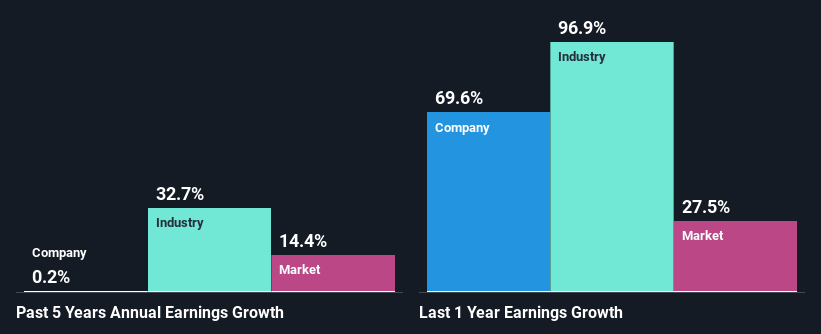Has United Therapeutics Corporation's (NASDAQ:UTHR) Impressive Stock Performance Got Anything to Do With Its Fundamentals?
Most readers would already be aware that United Therapeutics' (NASDAQ:UTHR) stock increased significantly by 40% over the past three months. Given that stock prices are usually aligned with a company's financial performance in the long-term, we decided to study its financial indicators more closely to see if they had a hand to play in the recent price move. In this article, we decided to focus on United Therapeutics' ROE.
Return on equity or ROE is a key measure used to assess how efficiently a company's management is utilizing the company's capital. Put another way, it reveals the company's success at turning shareholder investments into profits.
View our latest analysis for United Therapeutics
How Is ROE Calculated?
Return on equity can be calculated by using the formula:
Return on Equity = Net Profit (from continuing operations) ÷ Shareholders' Equity
So, based on the above formula, the ROE for United Therapeutics is:
16% = US$687m ÷ US$4.2b (Based on the trailing twelve months to March 2022).
The 'return' is the amount earned after tax over the last twelve months. Another way to think of that is that for every $1 worth of equity, the company was able to earn $0.16 in profit.
Why Is ROE Important For Earnings Growth?
We have already established that ROE serves as an efficient profit-generating gauge for a company's future earnings. We now need to evaluate how much profit the company reinvests or "retains" for future growth which then gives us an idea about the growth potential of the company. Generally speaking, other things being equal, firms with a high return on equity and profit retention, have a higher growth rate than firms that don’t share these attributes.
United Therapeutics' Earnings Growth And 16% ROE
At first glance, United Therapeutics seems to have a decent ROE. Even so, when compared with the average industry ROE of 22%, we aren't very excited. Further, United Therapeutics' five year net income growth of 0.2% is more or less flat. Not to forget, the company does have a decent ROE to begin with, just that it is lower than the industry average. Therefore, the flat earnings growth could be the result of other factors. For example, it could be that the company has a high payout ratio or the business has alloacted capital, for instance.
Next, on comparing with the industry net income growth, we found that United Therapeutics' reported growth was lower than the industry growth of 33% in the same period, which is not something we like to see.
Earnings growth is a huge factor in stock valuation. The investor should try to establish if the expected growth or decline in earnings, whichever the case may be, is priced in. This then helps them determine if the stock is placed for a bright or bleak future. If you're wondering about United Therapeutics''s valuation, check out this gauge of its price-to-earnings ratio, as compared to its industry.
Is United Therapeutics Using Its Retained Earnings Effectively?
United Therapeutics doesn't pay any dividend, meaning that potentially all of its profits are being reinvested in the business. However, this doesn't explain why the company hasn't seen any growth. So there could be some other explanations in that regard. For instance, the company's business may be deteriorating.
Summary
In total, it does look like United Therapeutics has some positive aspects to its business. Although, we are disappointed to see a lack of growth in earnings even in spite of a moderate ROE and and a high reinvestment rate. We believe that there might be some outside factors that could be having a negative impact on the business. With that said, the latest industry analyst forecasts reveal that the company's earnings are expected to accelerate. To know more about the company's future earnings growth forecasts take a look at this free report on analyst forecasts for the company to find out more.
Have feedback on this article? Concerned about the content? Get in touch with us directly. Alternatively, email editorial-team (at) simplywallst.com.
This article by Simply Wall St is general in nature. We provide commentary based on historical data and analyst forecasts only using an unbiased methodology and our articles are not intended to be financial advice. It does not constitute a recommendation to buy or sell any stock, and does not take account of your objectives, or your financial situation. We aim to bring you long-term focused analysis driven by fundamental data. Note that our analysis may not factor in the latest price-sensitive company announcements or qualitative material. Simply Wall St has no position in any stocks mentioned.

 Yahoo Sport
Yahoo Sport 







































